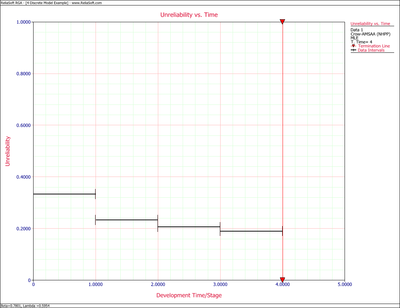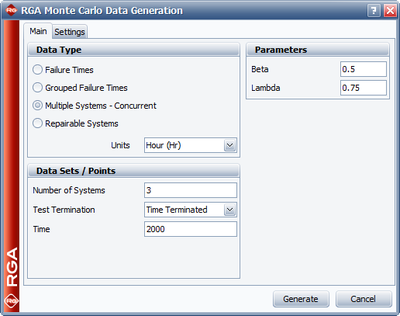Crow-AMSAA Discrete Model Example: Difference between revisions
Jump to navigation
Jump to search
mNo edit summary |
No edit summary |
||
| Line 1: | Line 1: | ||
<noinclude>{{Banner RGA Examples}} | <noinclude>{{Banner RGA Examples}} | ||
''This example appears in the [[Crow-AMSAA (NHPP)|Reliability Growth and Repairable System Analysis Reference | ''This example appears in the [[Crow-AMSAA (NHPP)|Reliability Growth and Repairable System Analysis Reference]]''. | ||
</noinclude> | </noinclude> | ||
| Line 10: | Line 10: | ||
*Configuration 4 experienced 4 failures. | *Configuration 4 experienced 4 failures. | ||
Do the following: | |||
#Estimate the parameters of the Crow-AMSAA model using maximum likelihood estimation. | |||
#Estimate the unreliability and reliability by configuration. | |||
'''Solution''' | '''Solution''' | ||
<ol> | |||
<li>The parameter estimates for the Crow-AMSAA model using the [[Crow-AMSAA (NHPP)#Parameter_Estimation_for_Discrete Data|parameter estimation for discrete data]] methodology yields <math>\lambda = 0.5954\,\!</math> and <math>\beta =0.7801\,\!</math>. | |||
</li> | |||
<li>The following table displays the results for probability of failure and reliability, and these results are displayed in the next two plots. | |||
<center>'''Estimated Failure Probability and Reliability by Configuration'''</center> | <center>'''Estimated Failure Probability and Reliability by Configuration'''</center> | ||
| Line 34: | Line 34: | ||
|4|| 0.190|| 0.810 | |4|| 0.190|| 0.810 | ||
|} | |} | ||
[[Image:rga5.16.png|center|400px|Estimated unreliability by configuration.]] | [[Image:rga5.16.png|center|400px|Estimated unreliability by configuration.]] | ||
[[Image:rga5.17.png|center|400px|Estimated reliability by configuration.]] | [[Image:rga5.17.png|center|400px|Estimated reliability by configuration.]] | ||
</li> | |||
</ol> | |||
Revision as of 00:10, 23 April 2014
New format available! This reference is now available in a new format that offers faster page load, improved display for calculations and images and more targeted search.
As of January 2024, this Reliawiki page will not continue to be updated. Please update all links and bookmarks to the latest references at RGA examples and RGA reference examples.
This example appears in the Reliability Growth and Repairable System Analysis Reference.
A one-shot system underwent reliability growth development testing for a total of 68 trials. Delayed corrective actions were incorporated after the 14th, 33rd and 48th trials. From trial 49 to trial 68, the configuration was not changed.
- Configuration 1 experienced 5 failures,
- Configuration 2 experienced 3 failures,
- Configuration 3 experienced 4 failures and
- Configuration 4 experienced 4 failures.
Do the following:
- Estimate the parameters of the Crow-AMSAA model using maximum likelihood estimation.
- Estimate the unreliability and reliability by configuration.
Solution
- The parameter estimates for the Crow-AMSAA model using the parameter estimation for discrete data methodology yields [math]\displaystyle{ \lambda = 0.5954\,\! }[/math] and [math]\displaystyle{ \beta =0.7801\,\! }[/math].
- The following table displays the results for probability of failure and reliability, and these results are displayed in the next two plots.
Estimated Failure Probability and Reliability by Configuration Configuration([math]\displaystyle{ i\,\! }[/math]) Estimated Failure Probability Estimated Reliability 1 0.333 0.667 2 0.234 0.766 3 0.206 0.794 4 0.190 0.810


